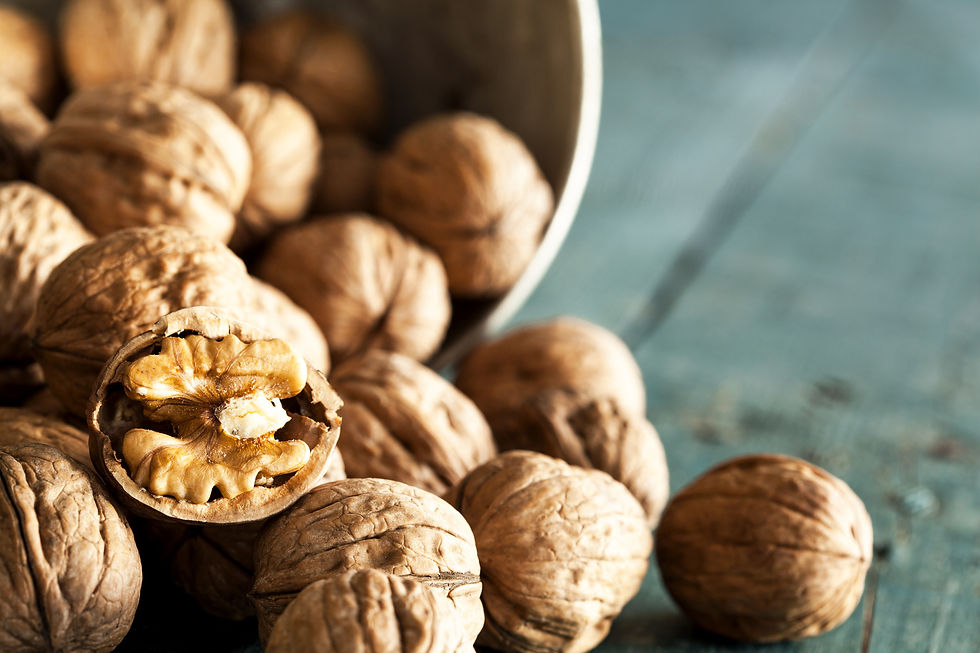Health Benefits of Walnuts
- oliver591
- Oct 10, 2021
- 3 min read
Updated: Oct 11, 2021

For many, choosing a healthy diet is all about sacrifice: foregoing the appetizers, cutting back on carbs or saturated fat, giving up dessert. But what if there was something you really liked that turned out to be good for you? No, I’m not talking about chocolate (although in small quantities, chocolate may not be so bad!).
This time it’s nuts in the news. Previous studies have found that people with higher nut consumption have improved cardiovascular risk factors and lower rates of cardiovascular disease. For example, several trials have linked nut consumption with lower blood pressure and cholesterol levels. And nuts are an important part of the Mediterranean diet, which has been found to be heart-healthy as well.
A new study looks at health benefits of walnuts
A new study suggests that walnuts may be a particularly good choice. And this isn’t the first time researchers have come to this conclusion. A previous analysis by the same researchers (including 365 study participants in 13 trials) found that diets enriched with walnuts led to lower total and LDL (“bad”) cholesterol when compared with other diets. Since then, more studies with far more study participants and longer follow-up have been published.
This latest analysis combined data from 26 previous trials that included more than 1,000 people; compared with those on a regular diet, those consuming a walnut-enriched diet had:
lower total cholesterol (by about 7 mg/dL, representing a 3% greater reduction)
lower LDL cholesterol (by about 5.5 mg/dL, a 4% greater reduction)
lower triglycerides (by about 5.7 mg/dL, a 5.5% greater reduction)
lower apoprotein B (a protein linked to cardiovascular disease) by nearly 4 mg/dL
While these improvements in blood lipids were rather small, larger improvements (for example, a 12 mg/dL drop in total cholesterol) were noted when the comparison diet was a typical US or western diet (that is, a diet high in red meats, high-fat dairy foods, and artificially sweetened foods).
A diet rich in high-fat foods such as nuts always raises the concern about the potential for weight gain, but fortunately those on the high-walnut diet did not gain weight.
Why would walnuts be so good for you?
While this new research is intriguing, it also raises the question of whether walnuts are unique in some way. In fact, it may be the types of oils in walnuts that make them special when it comes to cardiovascular health. Walnuts contain a lot of polyunsaturated fatty acids, which are healthier than saturated fats. In addition, walnuts have alpha-linolenic and linoleic acids, which may have anti-inflammatory effects that keep blood vessels healthy, in addition to having favorable effects on blood lipids.
All nuts are not created equal. Many nuts (such as my favorites, almonds and cashews) are rich in monounsaturated fats, along with polyunsaturated fats. These are healthier types of fats than saturated and trans fats, but the specific combination of fats and polyunsaturated fatty acids contained in walnuts may be particularly good for cardiovascular health.
Not so fast, walnut lovers
Before you start loading up on walnuts, there are some important caveats to keep in mind:
The improvements in blood lipids noted in this study were small.
This study did not determine the ideal “dose” or duration of walnut consumption. In one of the best studies, a mix of about nine hazelnuts, 12 almonds, and six walnuts were consumed daily. That might be more than some people are willing to eat!
A study of this type cannot prove that walnuts were the reason a person’s cholesterol improved with a walnut-enriched diet. It’s possible that those who like walnuts also tend to exercise more, smoke less, or have more favorable genes than those who don’t eat walnuts.
No single food in your diet can make you healthy. It’s the big picture that matters most. A healthy diet, regular exercise, avoiding excess weight, and not smoking are good starting points. And even with a healthy lifestyle, some people require medications or other treatments to reduce their risk of cardiovascular and other diseases.
Learn, Enjoy and Save Life. Healthforce Training Center offer services such as Basic Life Support (BLS), Advance Cadiovascular Life Support (ACLS), Pediatric Advance Life Support (PALS), CPR AED, Pediatric First Aid CPR AEDand First Aid CPR AED. Read more of our blogs.
Source(s):
Robert H. Shmerling, MD
Faculty Editor, Harvard Health Publishing





AV在线看 AV在线看;
自拍流出 自拍流出;
国产视频 国产视频;
日本无码 日本无码;
动漫肉番 动漫肉番;
吃瓜专区 吃瓜专区;
SM调教 SM调教;
ASMR ASMR;
国产探花 国产探花;
强奸乱伦 强奸乱伦;
代发外链 提权重点击找我;
蜘蛛池 蜘蛛池;
谷歌马甲包/ 谷歌马甲包;
谷歌霸屏 谷歌霸屏;
谷歌霸屏 谷歌霸屏
蜘蛛池 蜘蛛池
谷歌快排 谷歌快排
Google外链 Google外链
谷歌留痕 谷歌留痕
Gái Gọi…
Gái Gọi…
Dịch Vụ…
谷歌霸屏 谷歌霸屏
负面删除 负面删除
币圈推广 币圈推广
Google权重提升 Google权重提升
Google外链 Google外链
google留痕 google留痕
代发外链 提权重点击找我;
游戏推广 游戏推广;
Fortune Tiger Fortune Tiger;
Fortune Tiger Slots Fortune…
谷歌马甲包/ 谷歌马甲包;
谷歌霸屏 谷歌霸屏;
מכונות ETPU מכונות ETPU;
;ماكينات اي تي بي…
آلات إي بي بي…
ETPU maşınları ETPU maşınları;
ETPUマシン ETPUマシン;
ETPU 기계 ETPU 기계;
google seo google seo技术飞机TG-cheng716051;
03topgame 03topgame
gamesimes gamesimes;
Fortune Tiger Fortune Tiger;
Fortune Tiger Slots Fortune Tiger…
Fortune Tiger Fortune Tiger;
EPS машины EPS машины;
Fortune Tiger Fortune Tiger;
EPS Machine EPS Cutting Machine;
EPS Machine EPS and EPP…
EPP Machine EPP Shape Moulding…
EPS Machine EPS and EPP…
EPTU Machine ETPU Moulding Machine
EPS Machine EPS Cutting Machine;
google seo google seo技术飞机TG-cheng716051;
03topgame 03topgame
gamesimes gamesimes;
Fortune Tiger Fortune Tiger;
Fortune Tiger Slots Fortune Tiger…
Fortune Tiger Fortune Tiger;
EPS машины EPS машины;
Fortune Tiger Fortune Tiger;
EPS Machine EPS Cutting Machine;
EPS Machine EPS and EPP…
EPP Machine EPP Shape Moulding…
EPS Machine EPS and EPP…
EPTU Machine ETPU Moulding Machine
EPS Machine EPS Cutting Machine;